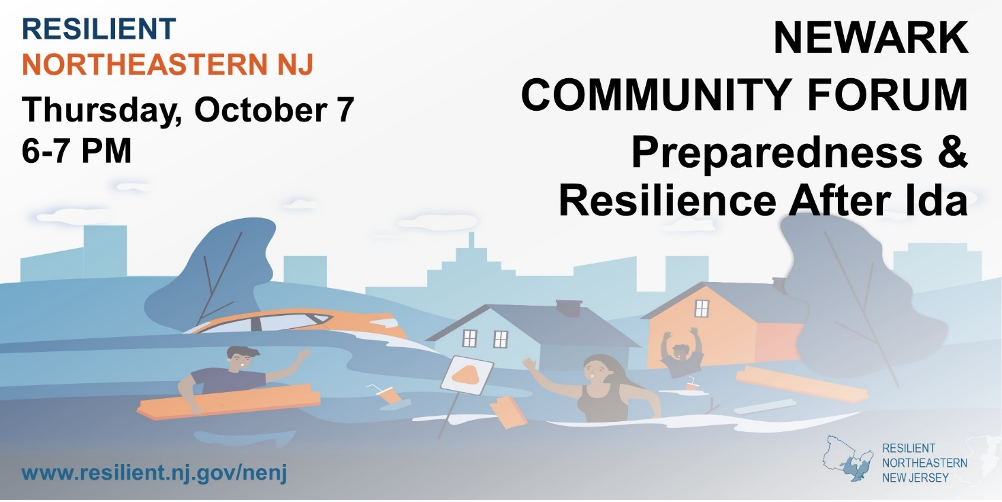On the night of September 1, 2021, the remnants of Hurricane Ida dropped record-breaking amounts of rainfall across New Jersey, with significant flooding and damage occurring in areas of Newark. Flood waters took days to recede in some areas, and residents were still dealing with the impacts of flooding weeks after the storm. Unfortunately, for many, the flooding from Ida was not the first time that flooding was experienced in the summer of 2021.
On October 7, 2021 from 6 – 7 PM, Resilient Northeastern NJ hosted a community forum for Newark community members to share their experiences during Ida and past storms, what went well, and what additional resources were needed. A short upfront presentation was given to introduce the project, and most of the time was spent discussing the following questions:
- Where did you experience flooding or hear about flooding occurring during the remnants of Hurricane Ida? How did the flooding impact you or your friends and family?
- What information did you receive about the storm in advance? What, if anything, did you find yourself wishing you would’ve known ahead of time in order to adequately prepare?
- What resources or services did you use leading up to and in the aftermath of the storm? What resources or services do you wish were available?
- Do you have any other feedback about what could have happened differently in relation to the storm?
The feedback that we heard during the community forum will contribute to an Ida after action report with recommendations related to preparedness, response, and resilience, and these recommendations will feed into the project’s regional resilience action plan.
MISSED THE MEETINGS, OR WANT TO SHARE ADDITIONAL FEEDBACK?
Please visit our virtual board to view feedback we’ve received so far and add your own thoughts.
You can also check-out the meeting materials linked below.
View the presentation slide deck here
View the community forum recording here
WHAT DID WE HEAR?
All the feedback that we heard during the community forum is compiled in our virtual board. We invite you to explore the board and add your feedback!
If you feel that we’ve missed anything or got something wrong, we encourage you to let us know by emailing ResilientNENJ@dep.nj.gov or calling 201-275-0861.
Some of the key themes we heard about during the meeting are summarized below:
- During Ida and the other severe storms this summer, flooding occurred in some areas that haven’t historically flooded. Flooding was also experienced by community members who are very used to seeing stormwater flooding in their neighborhood any time there is intense rainfall, like along South Street in the Ironbound neighborhood. Many property owners were not made aware that their homes were susceptible to flooding when they purchased the home, and one property owner had just purchased their home in July of 2021 and had already flooded three times since. The participant reported that the home was not located in the mapped floodplain and they had not been informed of the risk.
- This concern was noted by multiple participants, and the group agreed that more must be done to inform people of risk in an area they live or may wish to live, whether renting or buying
- Before Ida, many community members received robocalls from the City of Newark with warnings to stay off of the streets to avoid flooding and found this to be helpful. Participants expressed that the same method of communication could also be used to help direct residents to resources after Ida, and that in general the recovery communications could use a greater variety of channels (not just social media, but also radio, phone calls, the city’s website, door-to-door visits, and more).
- Participants expressed feeling frustration and discouragement in trying to figure out where to go for disaster recovery support and what resources are available. For example, participants expressed a lack of clarity about what phone numbers to call and issues with phone numbers not working; landlords found it difficult to understand how to receive support for their properties; and some residents reported giving up trying to receive disaster funding because of confusion with the system. Residents expressed desire to see a “single source of truth” or central hub for resource and risk information.
- Residents indicated a need for improved debris removal services in the aftermath of flood events. Some residents reported bringing debris out to the street and were then told to bring it back into their homes because of capacity issues. Residents reported experiencing a lack of clarity about the services being provided. Residents expressed concern about the health impacts of having flood debris sitting in their homes for days.
- Many community members expressed that they were still trying to understand how to receive support weeks after Ida, and expressed disappointment at the level of attention paid to needs post-disaster. Residents cited examples where they felt more attention was given to other city events than to people experiencing the impacts of Ida.

